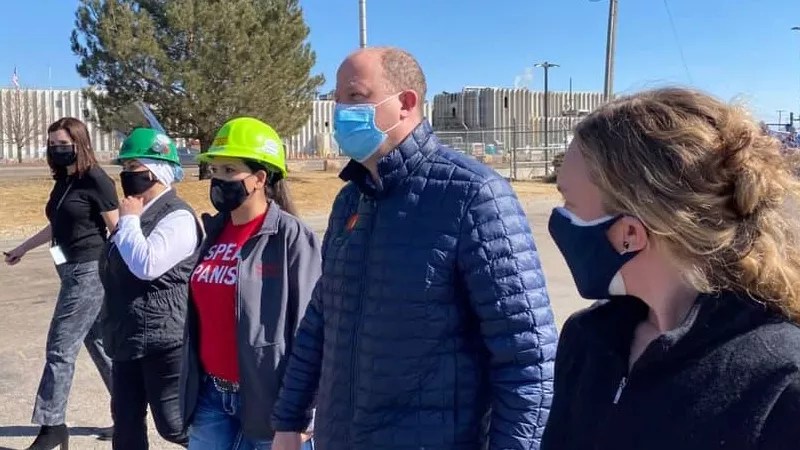

Audio By Carbonatix
Governor Jared Polis shared a number of upbeat developments about Colorado’s response to COVID-19 during a March 9 press conference. But the Colorado Department of Public Health and Environment’s Dr. Rachel Herlihy also offered a potentially concerning update on the appearance of a South African variant that is more transmissible than the typical strain of the novel coronavirus, one that vaccines don’t appear to be quite as effective against.
According to Polis, 838 new cases of COVID-19 were reported on March 9, about the daily number the state has seen over the past few weeks. But while infections have plateaued, hospitalizations continue to fall, with the 299 people currently admitted for care at medical centers around the state representing the first time that number has fallen below 300 in months. The number of people being tested daily – 10,374 – was lower than Polis would have liked, however; he encouraged anyone showing symptoms or fearing exposure to get tested, in order to slow the spread and help public-health officials gain a better sense of where the disease is most prevalent right now.
On March 5, Colorado moved on to another priority level for vaccinations; Polis stressed that any Colorado residents sixty and over can now be vaccinated, as can people between the ages of 16 and 59 with two or more high-risk conditions – and supplies shouldn’t be a problem. During a call with the White House earlier today, Polis learned that Colorado will receive approximately 17,000 more doses of Pfizer, Moderna and Johnson & Johnson vaccines over the next week than had previously been anticipated.
Polis acknowledged that the potential for a monster storm this weekend could result in delays for some people scheduled to be vaccinated, but he said he doesn’t anticipate any lingering supply issues, as occurred after a weather system paralyzed much of the Midwest a few weeks back.
Polis noted that 74 percent of Coloradans over the age of seventy and around 90 percent of teachers, child-care providers and others working in the education system already have been vaccinated with at least one dose. So have just under 60 percent of Coloradans between ages 65 and 69, and the governor expressed hope that the percentages in all categories will continue to ratchet upward.
Polis also cheered new federal guidance giving the go-ahead for fully vaccinated people to gather indoors with other people who are at least two weeks beyond their last shot without having to observe social distancing or mask use. He and his family plan to dine indoors at a restaurant for the first time in around a year once he’s at the fully protected stage, he said.
Still, the South African variant, technically known as B.1.351, remains a wild card, as Herlihy noted during her time in the spotlight. Late on March 7, the CDPHE announced the confirmation of three cases at the Colorado Department of Corrections’ Buena Vista Correctional Complex in Chaffee County – two among staffers and one involving an incarcerated person. Currently, the variant has been discovered in about twenty states, Herlihy said, and while more Colorado cases could be verified soon (further sequencing at the state’s lab is under way), the hope is that increasing vaccinations for Buena Vista workers, their family members and prisoners, along with isolation and quarantine procedures, can stop a major outbreak in its tracks.
Herlihy added that the number of U.K. variant cases in Colorado is now at 265, representing a substantial increase in just the past 24 hours, with other variants under investigation hitting 161 cases – and these are only estimates. The state is close to its goal of testing 5 percent of specimens to get a better idea of where variants are circulating, but it’s not there yet, Herlihy said. Even so, officials believe that between 3 and 6 percent of the state’s COVID cases now involve variants, up from between 0 to 3 percent, and that trend is expected to continue.
During a subsequent question-and-answer session, the March 6 party in Boulder’s University Hill neighborhood came up. Polis expressed disappointment in the behavior of participants at this “mask-less rager,” and said that it “jeopardizes everything we care about in our state: lives, higher education and the in-person experience, the faculty at those institutions.” He predicted that infections will pop up as a result of the gathering, and while students are a low-risk demographic, they could give the disease to others more likely to become significantly ill or worse.
“I know our college students want to party, and they will be able to do so soon enough – but not this week,” Polis concluded. “Hopefully, around graduation time, they can safely rejoice in their achievements.”